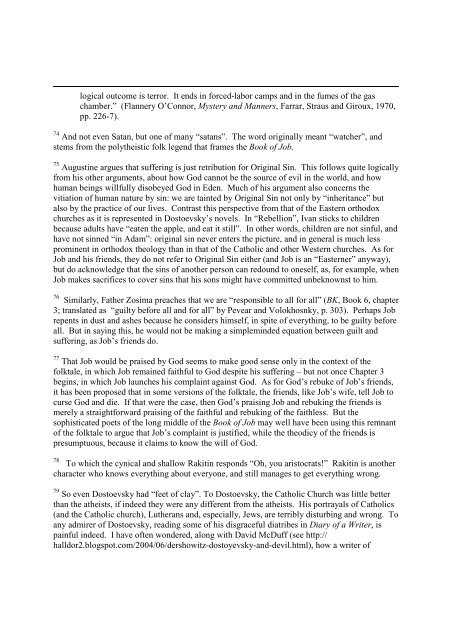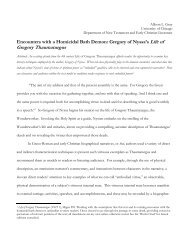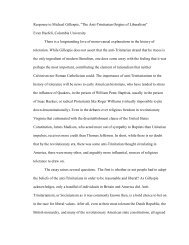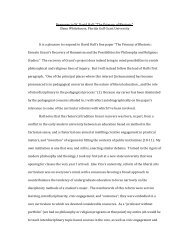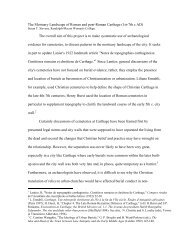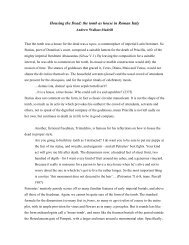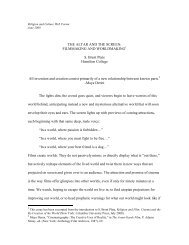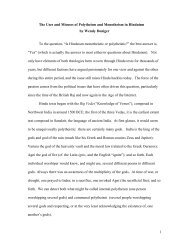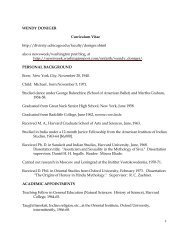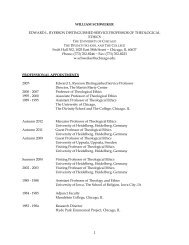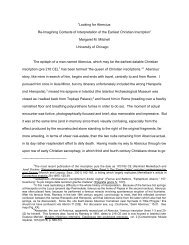The Reification of Evil and The Failure of Theodicy: The Devil in ...
The Reification of Evil and The Failure of Theodicy: The Devil in ...
The Reification of Evil and The Failure of Theodicy: The Devil in ...
You also want an ePaper? Increase the reach of your titles
YUMPU automatically turns print PDFs into web optimized ePapers that Google loves.
logical outcome is terror. It ends <strong>in</strong> forced-labor camps <strong>and</strong> <strong>in</strong> the fumes <strong>of</strong> the gas<br />
chamber.” (Flannery O’Connor, Mystery <strong>and</strong> Manners, Farrar, Straus <strong>and</strong> Giroux, 1970,<br />
pp. 226-7).<br />
74 And not even Satan, but one <strong>of</strong> many “satans”. <strong>The</strong> word orig<strong>in</strong>ally meant “watcher”, <strong>and</strong><br />
stems from the polytheistic folk legend that frames the Book <strong>of</strong> Job.<br />
75 August<strong>in</strong>e argues that suffer<strong>in</strong>g is just retribution for Orig<strong>in</strong>al S<strong>in</strong>. This follows quite logically<br />
from his other arguments, about how God cannot be the source <strong>of</strong> evil <strong>in</strong> the world, <strong>and</strong> how<br />
human be<strong>in</strong>gs willfully disobeyed God <strong>in</strong> Eden. Much <strong>of</strong> his argument also concerns the<br />
vitiation <strong>of</strong> human nature by s<strong>in</strong>: we are ta<strong>in</strong>ted by Orig<strong>in</strong>al S<strong>in</strong> not only by “<strong>in</strong>heritance” but<br />
also by the practice <strong>of</strong> our lives. Contrast this perspective from that <strong>of</strong> the Eastern orthodox<br />
churches as it is represented <strong>in</strong> Dostoevsky’s novels. In “Rebellion”, Ivan sticks to children<br />
because adults have “eaten the apple, <strong>and</strong> eat it still”. In other words, children are not s<strong>in</strong>ful, <strong>and</strong><br />
have not s<strong>in</strong>ned “<strong>in</strong> Adam”: orig<strong>in</strong>al s<strong>in</strong> never enters the picture, <strong>and</strong> <strong>in</strong> general is much less<br />
prom<strong>in</strong>ent <strong>in</strong> orthodox theology than <strong>in</strong> that <strong>of</strong> the Catholic <strong>and</strong> other Western churches. As for<br />
Job <strong>and</strong> his friends, they do not refer to Orig<strong>in</strong>al S<strong>in</strong> either (<strong>and</strong> Job is an “Easterner” anyway),<br />
but do acknowledge that the s<strong>in</strong>s <strong>of</strong> another person can redound to oneself, as, for example, when<br />
Job makes sacrifices to cover s<strong>in</strong>s that his sons might have committed unbeknownst to him.<br />
76 Similarly, Father Zosima preaches that we are “responsible to all for all” (BK, Book 6, chapter<br />
3; translated as “guilty before all <strong>and</strong> for all” by Pevear <strong>and</strong> Volokhosnky, p. 303). Perhaps Job<br />
repents <strong>in</strong> dust <strong>and</strong> ashes because he considers himself, <strong>in</strong> spite <strong>of</strong> everyth<strong>in</strong>g, to be guilty before<br />
all. But <strong>in</strong> say<strong>in</strong>g this, he would not be mak<strong>in</strong>g a simplem<strong>in</strong>ded equation between guilt <strong>and</strong><br />
suffer<strong>in</strong>g, as Job’s friends do.<br />
77 That Job would be praised by God seems to make good sense only <strong>in</strong> the context <strong>of</strong> the<br />
folktale, <strong>in</strong> which Job rema<strong>in</strong>ed faithful to God despite his suffer<strong>in</strong>g – but not once Chapter 3<br />
beg<strong>in</strong>s, <strong>in</strong> which Job launches his compla<strong>in</strong>t aga<strong>in</strong>st God. As for God’s rebuke <strong>of</strong> Job’s friends,<br />
it has been proposed that <strong>in</strong> some versions <strong>of</strong> the folktale, the friends, like Job’s wife, tell Job to<br />
curse God <strong>and</strong> die. If that were the case, then God’s prais<strong>in</strong>g Job <strong>and</strong> rebuk<strong>in</strong>g the friends is<br />
merely a straightforward prais<strong>in</strong>g <strong>of</strong> the faithful <strong>and</strong> rebuk<strong>in</strong>g <strong>of</strong> the faithless. But the<br />
sophisticated poets <strong>of</strong> the long middle <strong>of</strong> the Book <strong>of</strong> Job may well have been us<strong>in</strong>g this remnant<br />
<strong>of</strong> the folktale to argue that Job’s compla<strong>in</strong>t is justified, while the theodicy <strong>of</strong> the friends is<br />
presumptuous, because it claims to know the will <strong>of</strong> God.<br />
78 To which the cynical <strong>and</strong> shallow Rakit<strong>in</strong> responds “Oh, you aristocrats!” Rakit<strong>in</strong> is another<br />
character who knows everyth<strong>in</strong>g about everyone, <strong>and</strong> still manages to get everyth<strong>in</strong>g wrong.<br />
79 So even Dostoevsky had “feet <strong>of</strong> clay”. To Dostoevsky, the Catholic Church was little better<br />
than the atheists, if <strong>in</strong>deed they were any different from the atheists. His portrayals <strong>of</strong> Catholics<br />
(<strong>and</strong> the Catholic church), Lutherans <strong>and</strong>, especially, Jews, are terribly disturb<strong>in</strong>g <strong>and</strong> wrong. To<br />
any admirer <strong>of</strong> Dostoevsky, read<strong>in</strong>g some <strong>of</strong> his disgraceful diatribes <strong>in</strong> Diary <strong>of</strong> a Writer, is<br />
pa<strong>in</strong>ful <strong>in</strong>deed. I have <strong>of</strong>ten wondered, along with David McDuff (see http://<br />
halldor2.blogspot.com/2004/06/dershowitz-dostoyevsky-<strong>and</strong>-devil.html), how a writer <strong>of</strong>


